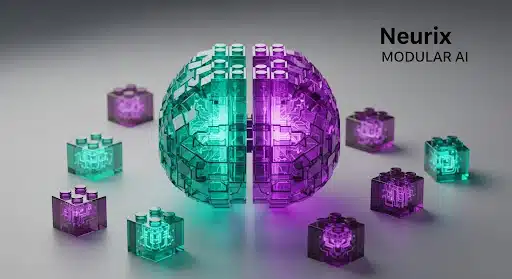In the increasingly noisy world of artificial intelligence, much of the spotlight remains on language models, text-to-image generators, and autonomous agents, but NodeShift Nigeria, is focused on something deeper — something foundational.
At the heart of this movement is a new class of systems known as orchestration networks: dynamic frameworks where AI agents work together across tools and data. Neurix, which Odo describes as a “living network” of intelligent agents, performs sophisticated, multi-step operations without the rigidity of traditional SaaS workflows.
The Next Layer of AI Infrastructure
Today’s SaaS platforms rely on a rigid structure of predefined operations. But in a world where AI agents can reason, learn, and act, those boundaries start to feel dated.

Neurix is designed as a modular orchestration network where intelligent agents operate across platforms and interfaces. These agents aren’t bound to single functions — they collaborate and delegate tasks like human teams.
Intelligence in Collaboration
Orchestration frameworks — where modular AI agents collaborate — are gaining traction in research for their potential to enable adaptive, intelligent systems. Organizations like IBM and OpenAI have explored this space, especially around agentic collaboration and multi-model systems that adapt to new tasks in real time.
Neurix aligns with this shift, supporting a new kind of software logic built for coordination over brute force.
Pioneering Context-Aware Ecosystems
The Neurix prototype demo showcases how multiple AI agents can integrate existing tools to deliver intuitive, context-aware responses. By coordinating diverse data sources, Neurix tailors outputs to user needs. For instance, when creating a report, it compiles data and adds context like maps or charts — streamlining workflows in analytics, HR, or customer support.
This versatility positions the platform as a potential backbone for a wide range of applications. Its AI-native infrastructure aspires to power an “everything app” — a unified ecosystem that adapts and evolves, rather than hard-coding every feature.
Built for Scale, From the Ground Up
Uniquely, this project is being built in Nigeria — a strategic choice.
Without the weight of legacy systems or entrenched software paradigms, the NodeShift Nigeria team is free to design infrastructure from first principles. Their focus is less on retrofitting yesterday’s platforms and more on imagining what truly AI-native ecosystems should look like.
The team’s approach reflects a deeper belief: that real innovation often comes from places that aren’t yet over-optimized. “Sometimes the lack of an established playbook is the opportunity,” Odo notes.
A Modular Future
Neurix aims to create a flexible AI system where smart agents work together like building blocks, easily fitting into any setup. Instead of being just a chatbot or a fixed tool, Neurix is designed to be a hidden backbone that powers smarter, smoother digital experiences.
“Think of how a single lightbulb lit up a room a century ago, but now screens use millions of tiny pixels to create vivid images,” Samson Odo says. “Neurix does something similar, combining simple AI pieces into a smarter, more powerful system.”
This vision positions NodeShift Nigeria as the foundation for next-generation digital systems — quietly powering personalized reports and automated workflows in the background, much like how the internet connects millions of servers and devices behind the scenes to deliver a seamless user experience. The complexity is abstracted away, but the orchestration makes everything possible.
The Bigger Picture
As the world debates when AI might achieve human-like intelligence or what ethical rules it should follow, a simpler idea is taking shape: The future of AI lies in how its parts collaborate, not just its intelligence. Neurix builds this future with flexible frameworks connecting specialized AI tools for practical tasks.
This approach also addresses one of the biggest challenges in AI adoption; the black box problem. By breaking down tasks into transparent, modular agents, Neurix offers greater visibility into how decisions are made. That makes it not just powerful, but ethical by design — a critical advantage for enterprises and governments looking to embed AI into their systems with accountability and trust.
Samson is boldly leading this effort, with a vision to make AI systems as seamless and interconnected as the internet itself.
“I want to build tools that work quietly in the background, making life easier without drawing attention,” he says.
In a world racing toward ever more powerful models, NodeShift Nigeria’s focus on modular, invisible infrastructure is a reminder that true intelligence isn’t always loud — it’s coordinated. By rethinking how AI systems are built, connected, and deployed, they’re laying the groundwork for a future where intelligence flows effortlessly through everything we touch.





